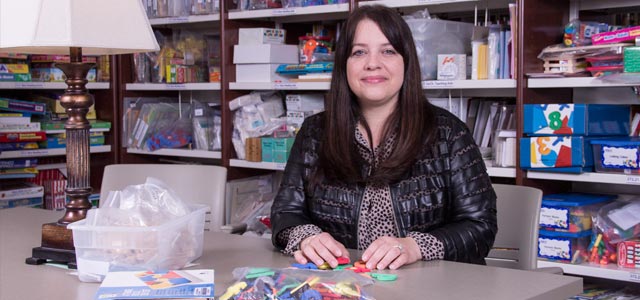Baylor Autism Resource Clinic a regional hub of services for families affected by autism.

Established in 2008 by associate professor of educational psychology, Dr. Julie Ivey-Hatz,
the BARC provides a variety of services and programs to autism-affected families as part
of the university's community outreach.
 Dr. Julie Ivey-Hatz
Dr. Julie Ivey-Hatz
Associate Professor, Educational Psychology Director/Founder of the Baylor Autism Resource Clinic
WACO, TX - Established in 2008 by associate professor of educational psychology, Dr. Julie Ivey-Hatz, the BARC provides a variety of services and programs to autism-affected families as part of the university's community outreach.
Social Circles is a program in which parents can drop off their children with autism at Baylor for an hour each week. While there, the children receive specialized training in a range of social and communication skills taught by graduate students in Baylor's school psychology program. It is one of the BARC's most popular services.
"It's nice in that parents can drop their kids off and know that we're going to be calling in an hour to come pick them up," Ivey-Hatz said. "Parents can be certain their children are safe because they know that, as professionals, we know how to work with them."
Additionally, the BARC maintains a lending library of books and other materials for families and their children. And each June up to 30 children with autism enjoy the BARC's summer camp on the Baylor campus where graduate student counselors lead them in games and activities.
"We're actually out here at the Fountain Mall," said Ivey-Hatz. "We take them to the tennis courts, we rent water slides and let them do artwork; we make a craft. We take them to the Mayborn Museum one day during the camp and several businesses and organizations in the community come and set up activity booths. It's a whole week of kids!"
Ivey-Hatz also operates a support group for college-age students with autism attending Baylor and other area colleges. The support group serves non-students of that age group from the surrounding community as well.
Likely the BARC's most important service is conducting assessments and evaluations for parents who are referred by doctors, teachers and others who have noticed behaviors in their child that may indicate autism.
"During the year I always arrange to have a panel of parents speak to my classes. Most of the parents tell me that the first person to tell them (of the need for an evaluation) was their church daycare teacher or their Mother's Day Out teacher. That's because they are usually the first person to see the child in a classroom environment," she says.
In the broader community, Ivey-Hatz is working with officials to set up autism-friendly areas at Waco's popular Cameron Park Zoo, and is helping parents learn how to get their child with autism through airport security and onto a plane and other needed skills.
The clinic is also a key resource for Central Texas school districts. Regionally, the BARC conducts evaluations and assessments for rural schools that cannot afford a full-time school psychologist.
The BARC represents a rich resource for families, teachers and others in the community. And through Baylor's school psychologist program, Ivey-Hatz and her colleagues are training a cadre of professionals who are uniquely prepared to serve their communities after graduation.
"All school psychologists will have to work with kids who have developmental disabilities, and that will include many with autism. School districts prefer to have someone who is comfortable in that situation and knows how to do evidence-based intervention in the area of autism. So I do this as much for our students as for the kids and families we serve."
For more information go to the BARC website, or call 254-537-1042. You may also contact the clinic by email at autism@baylor.edu.